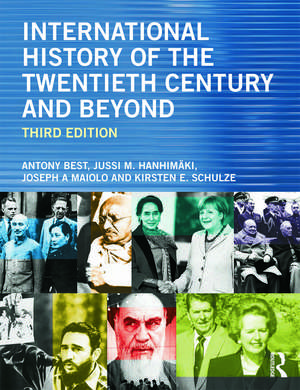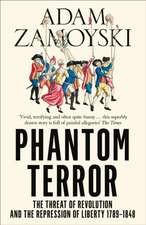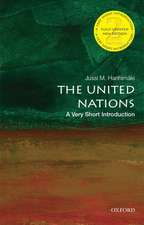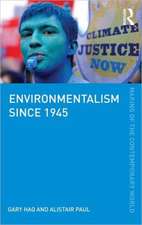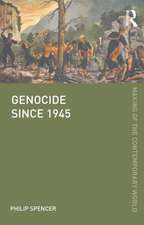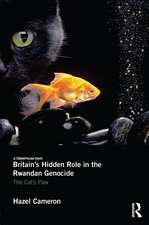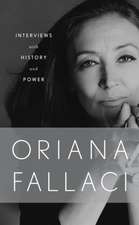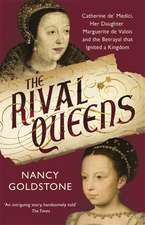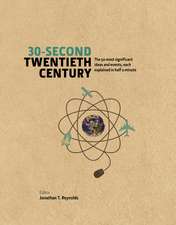International History of the Twentieth Century and Beyond
Autor Antony Best, Jussi M. Hanhimäki, Joseph A. Maiolo, Kirsten E. Schulzeen Limba Engleză Paperback – 12 dec 2014
Using their thematic and regional expertise, the authors have produced an authoritative yet accessible and seamless account of the history of international relations in the last century, covering events in Europe, Asia, the Middle East, Africa and the Americas. They focus on the history of relations between states and on the broad ideological, economic and cultural forces that have influenced the evolution of international politics over the past one hundred years.
The third edition is thoroughly updated throughout to take account of the most recent research and global developments, and includes a new chapter on the international history of human rights and its advocacy organizations, including NGOs.
Additional new features include:
- New material on the Arab Spring, including specific focus on Libya and Syria
- Increased debate on the question of US decline and the rise of China.
- A timeline to give increased context to those studying the topic for the first time.
- A fully revised companion website including links to further resources and self-testing material can be found at www.routledge.com/cw/best
| Toate formatele și edițiile | Preț | Express |
|---|---|---|
| Paperback (2) | 304.68 lei 3-5 săpt. | +53.02 lei 6-12 zile |
| Taylor & Francis – 3 sep 2024 | 304.68 lei 3-5 săpt. | +53.02 lei 6-12 zile |
| Taylor & Francis – 12 dec 2014 | 513.45 lei 18-23 zile | +46.55 lei 6-12 zile |
| Hardback (2) | 986.86 lei 6-8 săpt. | |
| Taylor & Francis – 3 sep 2024 | 986.86 lei 6-8 săpt. | |
| Taylor & Francis – 19 dec 2014 | 1084.26 lei 6-8 săpt. |
Preț: 513.45 lei
Nou
Puncte Express: 770
Preț estimativ în valută:
98.25€ • 105.06$ • 81.92£
98.25€ • 105.06$ • 81.92£
Carte disponibilă
Livrare economică 24-29 martie
Livrare express 12-18 martie pentru 56.54 lei
Preluare comenzi: 021 569.72.76
Specificații
ISBN-13: 9780415656429
ISBN-10: 0415656427
Pagini: 696
Ilustrații: 6 black & white tables, 47 black & white halftones, 3 black & white line drawings
Dimensiuni: 189 x 246 x 35 mm
Greutate: 1.49 kg
Ediția:Revised
Editura: Taylor & Francis
Colecția Routledge
Locul publicării:Oxford, United Kingdom
ISBN-10: 0415656427
Pagini: 696
Ilustrații: 6 black & white tables, 47 black & white halftones, 3 black & white line drawings
Dimensiuni: 189 x 246 x 35 mm
Greutate: 1.49 kg
Ediția:Revised
Editura: Taylor & Francis
Colecția Routledge
Locul publicării:Oxford, United Kingdom
Public țintă
UndergraduateCuprins
List of illustrations. Notes on authors. Acknowledgements. Note on the text. List of abbreviations. Visual tour. INTRODUCTION. The third edition. The second edition. Introduction to the twentieth century. 1. GREAT POWER RIVALRY AND THE WORLD WAR, 1900–1917. Introduction. The Great Powers, power politics and the states system. The long-term causes of the First World War. From one crisis to the next, 1905–13. 1914: decisions for war. The triple stalemate. Conclusion. Recommended reading. 2. THE SEARCH FOR EUROPEAN STABILITY, 1917–29. Introduction. The ‘new diplomacy’. The armistice. The Paris peace settlement. The Paris peace settlement in Central and Eastern Europe. The implementation of the peace. The Locarno era. Conclusion. Recommended reading. 3. JAPAN, CHINA AND THE ORIGINS OF THE PACIFIC WAR, 1900–41. Introduction. The First World War in East Asia. The Washington Conference. Chinese nationalism and the Northern Expedition. The Manchurian Crisis. Japan’s ‘Monroe Doctrine’ for East Asia. The Sino-Japanese War. Towards the Pacific War. Conclusion. Recommended reading. 4. THE EUROPEAN COLONIAL EMPIRES, 1900–45. Introduction. Empires and power. Ireland and the British Dominions. Empire and nationalism in the Middle East. India in crisis. Rationalization and resistance in South-East Asia. The colonial empires in Africa. The Second World War and empire. Conclusion. Recommended reading. 5. THE ORIGINS OF THE ARAB–ISRAELI CONFLICT, 1900–48. Introduction. The origins and development of Zionism. Palestinian nationalism. The twice-promised land. The mandate and British policy. Palestine and the Second World War. Partition and the end of the mandate. Arab and Zionist institution-building. The 1948 war. Conclusion. Recommended reading. 6. ‘GOOD NEIGHBORS’? THE UNITED STATES AND THE AMERICAS, 1900–45. Introduction. The Monroe Doctrine and the imperial thrust. The Spanish–American War. Theodore Roosevelt and the American empire. Woodrow Wilson, the First World War and the Americas. Wilsonian visions defeated. From boom to bust. From gunboat diplomacy to the ‘Good Neighbor’ policy. Pan-Americanism and the approach of war. The Second World War and the Monroe Doctrine. Conclusion. Recommended reading. 7. THE PATH TO EUROPEAN WAR, 1930–39. Introduction. The dual crisis. The collapse of the Weimar Republic. Revolution and expansion. Diplomacy and deterrence. Isolation and co-existence. From Munich to European war. Conclusion. Recommended reading. 8. THE SECOND WORLD WAR, 1940–45. Introduction. From European war to World War. The Axis at war. The Grand Alliance at war. The collapse of the Grand Alliance. Conclusion. Recommended reading. 9. THE ‘FIRST’ COLD WAR IN EUROPE, 1945–61. Introduction. The German question. From takeovers to conformity: the USSR and Eastern Europe. The United States, containment and Western Europe. On every front. Stability and revolts. A wasting asset? Nuclear weapons. Culture and propaganda. The Berlin Wall. Conclusion. Recommended reading. 10. ASIA IN TURMOIL: NATIONALISM, REVOLUTION AND THE RISE OF THE COLD WAR, 1945–53. Introduction. The end of the Raj. Nationalism and independence in South-East Asia. The Chinese Civil War. China, Japan and the Cold War in Asia. The Korean War. Asia and the consequences of the Korean War. Conclusion. Recommended reading. 11. FROM COLD WAR TO DÉTENTE, 1962–79. Introduction. The Cuban Missile Crisis. Towards the world of MAD. France, Germany and the origins of European détente. Trouble in the Soviet bloc. Triangular diplomacy and the ‘two détentes’. Détente in trouble: Watergate, Angola and the Horn of Africa. The death of détente: SALT II and Afghanistan. Conclusion. Recommended reading. 12. THE VIETNAM WARS, 1945–79. Introduction. The origins of the conflict and the first Indochina War. Divided Vietnam and American nation-building. The Americanization of the Vietnam War. ‘Peace’ and unification. Indochina in turmoil after 1975. Conclusion. Recommended reading. 13. NEUTRALISM, DEVELOPMENT AND THE RISE OF THE THIRD WORLD, 1945–2014. Introduction. Neutrality in Cold War Europe. India and the path to Bandung. The birth of the Non-Aligned Movement. Development and the Group of 77. The fragmentation of the Third World. The environment, sustainable development and climate change. Conclusion. Recommended reading. 14. THE ‘DEVELOPMENTAL STATES’: JAPAN, SOUTH KOREA AND TAIWAN, 1945–2014. Introduction. The American occupation of Japan. The ‘1955 system’ and the revision of the Security Treaty. High-speed growth and its discontents. Japan as an economic superpower. Post-‘bubble’ Japan. South Korea and Taiwan. Conclusion. Recommended reading. 15. THE PEOPLE’S REPUBLIC OF CHINA AND NORTH KOREA: IDEOLOGY AND NATIONALISM, 1949–2014. Introduction. The rise and decline of the Sino-Soviet alliance. Revolutionary China and the Third World. The opening to America and the death of Mao. Deng and the ‘Four Modernizations’. Tiananmen and after: the rise to global prominence. North Korea: the last Stalinist state. Conclusion. Recommended reading. 16. THE UNITED STATES AND LATIN AMERICA, 1945–2014. Introduction. Hemispheric unity, internal dislocation. Guatemala. The Cuban Revolution. The Alliance for Progress. Revolutionaries and reformers from Chile to Nicaragua. Into the new millennium: an age of uncertainty. Conclusion. Recommended reading. 17. AFRICA: DECOLONIZATION AND INDEPENDENCE, 1945–2014. Introduction. The end of empire. The rise and fall of pan-Africanism. Imperialism and ‘white rule’ in southern Africa. The Cold War in Africa. The end of apartheid in South Africa. The African state and the legacy of empire. Poverty, resources and the troubled road to democracy. Conclusion. Recommended reading. 18. THE ARAB–ISRAELI CONFLICT, 1949–2014. Introduction. The 1956 Suez–Sinai campaign. The 1967 June War. The 1973 October War. The 1982 Lebanon War. The Palestinian armed struggle from the 1948 naqba to the 1987 intifada. The peace process and its collapse. The 2006 Gaza offensive and Lebanon war. Gaza wars, 2006-2014. Renewal of negotiations, the Arab spring, and American peace initiatives. Conclusion. Recommended reading. 19. THE RISE OF POLITICAL ISLAM, 1928–2014. Introduction. The rise of political Islam. Islamist movements: aims, strategies and political philosophies. The 1979 Islamic revolution in Iran. Fundamentalist Islam: Afghanistan and the Taliban. Islamic resistance: Hizb’allah, Hamas and Laskar Jihad. Transnational and global jihadism. The Syrian jihad. Conclusion. Recommended reading. 20. THE END OF THE COLD WAR AND THE ‘NEW WORLD ORDER’, 1980–2000. Introduction. The superpowers and the Third World. The disintegration of the Soviet bloc. The First Gulf War. The unipolar moment: America at the apex. The ‘new world order’ and ethnic conflict. Conclusion. Recommended reading. 21. THE RISE OF A NEW EUROPE: THE HISTORY OF EUROPEAN INTEGRATION, 1945–2014. Introduction. The idea of Europe. From the Second World War to the Treaty of Rome. Widening and deepening in the shadow of the Cold War. An ever-wider Europe and the conundrums of success. The Eurozone crisis. The EEC/EU as inspiration: integration in Asia and the Americas. Conclusion. Recommended reading. 22. THE RISE OF HUMAN RIGHTS IN INTERNATIONAL HISTORY. Introduction. Human rights before the First World War. The League of Nations, population politics and minority rights. The United Nations and the Universal Declaration on Human Rights. Human rights in the age of the Cold War. The ‘right to protect’: humanitarian intervention and the punishment of war crimes. Whose human rights? Paradoxes and problems. Conclusion. Recommended reading. 23. US DECLINE IN A GLOBALIZED WORLD? Introduction. From 9/11 to ‘Iraqi Freedom’. Backfire: Iraq, Afghanistan and the war on terror. The ‘war on terror’ in South-East Asia. The challenge of nuclear proliferation. America’s conundrums: hyperpower humbled. Conclusion. Recommended reading. CONCLUSION: WHERE TO NEXT? Glossary. Index.
Descriere
The third edition of this hugely successful international history of the twentieth century is thoroughly updated throughout to take account of the most recent research and global developments, and includes a new chapter on the history of human rights. Supported by an overhauled, expanded and freely available website this is the essential student textbook for studying the history of the world in the twentieth century and beyond.
Recenzii
Praise of previous edition:
'Comprehensive and conceptually sophisticated, this history does more than recount the events of the past century, it explains them lucidly and engages the reader in crucial questions. There is no better guide to where we are and how we got there. I wish I had been assigned a book as good as this when I was a student.'
Robert Jervis, Adlai E. Stevenson Professor of International Politics, Columbia University, USA
'From the underlying causes of World War I to those behind the present decline of American influence, this third edition of a recognized classic provides a thoughtful, coherent, challenging, up-to-date and increasingly comprehensive account of the international history of the twentieth century and the opening decades of the present one. Caveat emptor: readers who dip in to learn something specific about one of the many conflicts and relationships it covers will inevitably be drawn into reading the entire chapter, if not the book.'
Ned Lebow, Professor of International Political Theory, King’s College London, UK
'This book is an impressive work of historical synthesis: it is comprehensive, sophisticated, and accessible. Students of History, International Relations, and Political Science should have it in their basic library, while non-academic readers will benefit from its overview of the revolutionary century that has passed, as a prelude to living in the revolutionary decades ahead. Highly recommended.'
Ken Booth FBA, President of the David Davies Memorial Institute of International Affairs, and Senior Research Associate, Department of International Politics, Aberystwyth University, UK
‘Students love this textbook on the International history of the Twentieth Century, so do their teachers. This third edition is most welcome. We enjoy a main story vividly and clearly told in chapters that also live their own independent lives. The historiographical surveys are marvels of clarity and compactness, and the questions that are addressed to the literature provide excellent pathways to further reading and classroom discussions. For this third edition the authors have succeeded admirably in bringing the book into the second decade of the 21st century. I am particularly pleased with the chapter on human rights, a topic for far too long neglected by most historians of international relations.’
Helge Pharo, Professor of International History, University of Oslo, Norway
'Comprehensive and conceptually sophisticated, this history does more than recount the events of the past century, it explains them lucidly and engages the reader in crucial questions. There is no better guide to where we are and how we got there. I wish I had been assigned a book as good as this when I was a student.'
Robert Jervis, Adlai E. Stevenson Professor of International Politics, Columbia University, USA
'From the underlying causes of World War I to those behind the present decline of American influence, this third edition of a recognized classic provides a thoughtful, coherent, challenging, up-to-date and increasingly comprehensive account of the international history of the twentieth century and the opening decades of the present one. Caveat emptor: readers who dip in to learn something specific about one of the many conflicts and relationships it covers will inevitably be drawn into reading the entire chapter, if not the book.'
Ned Lebow, Professor of International Political Theory, King’s College London, UK
'This book is an impressive work of historical synthesis: it is comprehensive, sophisticated, and accessible. Students of History, International Relations, and Political Science should have it in their basic library, while non-academic readers will benefit from its overview of the revolutionary century that has passed, as a prelude to living in the revolutionary decades ahead. Highly recommended.'
Ken Booth FBA, President of the David Davies Memorial Institute of International Affairs, and Senior Research Associate, Department of International Politics, Aberystwyth University, UK
‘Students love this textbook on the International history of the Twentieth Century, so do their teachers. This third edition is most welcome. We enjoy a main story vividly and clearly told in chapters that also live their own independent lives. The historiographical surveys are marvels of clarity and compactness, and the questions that are addressed to the literature provide excellent pathways to further reading and classroom discussions. For this third edition the authors have succeeded admirably in bringing the book into the second decade of the 21st century. I am particularly pleased with the chapter on human rights, a topic for far too long neglected by most historians of international relations.’
Helge Pharo, Professor of International History, University of Oslo, Norway
Notă biografică
Antony Best is Professor in International History at the London School of Economics. He works on modern East Asian international history. His most recent book is British Engagement with Japan, 1854–1923: The Origins and Course of an Unlikely Alliance (2020).
Jussi M. Hanhimäki is Professor of International History and Politics at the Graduate Institute of International and Development Studies in Geneva, Switzerland. He works on US foreign policy, the international history of the Cold War, and transatlantic relations. His latest book is Pax Transatlantica: America and Europe in the Post-Cold War Era (2021).
Joseph A. Maiolo is Professor of International History in the Department of War Studies at King’s College London. He works on the history of international relations in the first half of the twentieth century. His latest book, co-authored with Laura Robson, is The League of Nations (2023).
Kirsten E. Schulze is Professor in International History at the London School of Economics. She works on the Middle East and Southeast Asia. Her latest book is Contesting Indonesia: Islamist, Separatist, and Communal Violence since 1945 (2024).
Jussi M. Hanhimäki is Professor of International History and Politics at the Graduate Institute of International and Development Studies in Geneva, Switzerland. He works on US foreign policy, the international history of the Cold War, and transatlantic relations. His latest book is Pax Transatlantica: America and Europe in the Post-Cold War Era (2021).
Joseph A. Maiolo is Professor of International History in the Department of War Studies at King’s College London. He works on the history of international relations in the first half of the twentieth century. His latest book, co-authored with Laura Robson, is The League of Nations (2023).
Kirsten E. Schulze is Professor in International History at the London School of Economics. She works on the Middle East and Southeast Asia. Her latest book is Contesting Indonesia: Islamist, Separatist, and Communal Violence since 1945 (2024).
